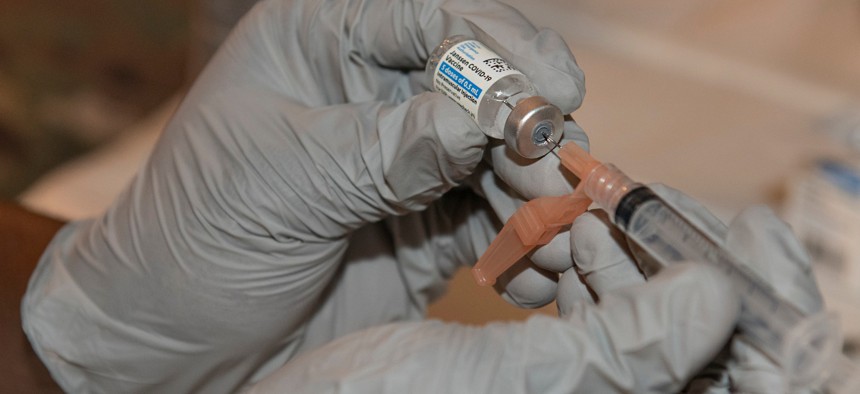
Mass Communication Specialist 1st Class Natalia Murillo/Navy
CDC and FDA Recommend Pausing Johnson & Johnson COVID-19 Vaccine After Rare Blood Clot Events
Six women developed blood clots after getting the shot out of the 6.8 million people who had gotten a vaccine so far.
The federal government recommended a pause Tuesday on Johnson & Johnson’s one-dose coronavirus vaccine after six women developed blood clots within two weeks of taking the shot.
The blood clots are exceedingly rare — more than 6.8 million people have gotten the Johnson & Johnson vaccine so far, making the chance of having developed a clot less than 1 in a million. Every case occurred in a woman between ages 18 and 48.
It’s not immediately clear what will happen for people who had appointments Tuesday to receive a Johnson & Johnson vaccine. A top advisory committee to the Centers for Disease Control will meet Wednesday to discuss the data.
The CDC and Food & Drug Administration will also provide more information later Tuesday.
“We are recommending a pause in the use of this vaccine out of an abundance of caution,” Dr. Anne Schuchat, principal deputy director of the CDC and Dr. Peter Marks, director of the FDA’s Center for Biologics Evaluation and Research, said in a statement. “This is important, in part, to ensure that the health care provider community is aware of the potential for these adverse events and can plan for proper recognition and management due to the unique treatment required with this type of blood clot.”
The issue involves cerebral venous sinus thrombosis, a blood clot that is very rare and requires different treatment from other kinds of blood clots. And the concern appears similar to a blood clot seen in rare cases with the AstraZeneca vaccine, which is being used in many other countries but not yet in the United States. Some countries have temporarily paused the use of the AstraZeneca shot, but public health experts have stressed that the rarity of developing a blood clot does not outweigh the immense benefit of getting a vaccine.
So far, more women than men have received coronavirus vaccines, a gap explained in part — but not entirely — by the larger number of women in the health care workforce, and the fact that women tend to live longer than men.
The Johnson & Johnson vaccines make up a fraction of the 190 million COVID-19 vaccine doses administered in the United States.
Originally published by The 19th
NEXT STORY: OPM Looks to Update Federal Job Competencies






